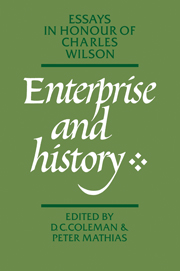Book contents
- Frontmatter
- Contents
- Preface
- List of contributors
- Part I Images and interpretations
- Part II England and the Low Countries in pre-industrial times
- Part III Enterprise, finance and politics in the modern world
- 10 The Bank of Rome and commercial credit, 1880–1914
- 11 The scientific brewer: founders and successors during the rise of the modern brewing industry
- 12 Large firms in Belgium, 1892–1974: an analysis of their structure and growth
- 13 ‘No bloody revolutions but for obstinate reactions’? British coalowners in their context, 1919–20
- 14 French oil policy, 1917–30: the interaction between state and private interests
- 15 Reflections on the Dutch economic interests in the East Indies
- Bibliography of Charles Wilson's published works
- Index
13 - ‘No bloody revolutions but for obstinate reactions’? British coalowners in their context, 1919–20
Published online by Cambridge University Press: 12 March 2010
- Frontmatter
- Contents
- Preface
- List of contributors
- Part I Images and interpretations
- Part II England and the Low Countries in pre-industrial times
- Part III Enterprise, finance and politics in the modern world
- 10 The Bank of Rome and commercial credit, 1880–1914
- 11 The scientific brewer: founders and successors during the rise of the modern brewing industry
- 12 Large firms in Belgium, 1892–1974: an analysis of their structure and growth
- 13 ‘No bloody revolutions but for obstinate reactions’? British coalowners in their context, 1919–20
- 14 French oil policy, 1917–30: the interaction between state and private interests
- 15 Reflections on the Dutch economic interests in the East Indies
- Bibliography of Charles Wilson's published works
- Index
Summary
Few groups of businessmen have received such a bad press in the twentieth century as the British coalowners. Hysterically individualistic, obstinate to a socially destructive degree, inhumane in their dealings with wages and with working and living conditions, above all reactionary in their attitudes to economic systems and technical or organizational change–their stereotyped characteristics have lost them the historical argument as surely as they sapped their public authority in all the propaganda battles which culminated in their expropriation in 1946.
Even if it were possible to envisage an attempt to resuscitate the coalowners' moral, political or economic standing, this would not be the place for such a herculean task. Rather, the purpose of this essay is to examine the context and content of the views propounded by the coalowners' representatives in the years immediately following the First World War, and especially in 1919–20–a brief period of particularly illuminating revelation, when, according to the Secretary of the Mining Association of Great Britain (henceforth MAGB or Mining Association) ‘the whole country was in a state of nerves … [and] there were very many people who thought we were on the brink of social revolution’. For, even though historians are aware of the circumstances which shaped the coalowners' economic attitudes, there is still an understandable tendency to present them as a coherent, almost spontaneous, ideology-divorced from economic reality or culpably inconsistent with the goals of other groups in society. In fact, however, as is generally the case, policy and argument in the coal industry were shaped by ‘external’ economic and historical realities, by political pressures and concepts of self-respect and group antipathy, by the dynamics of organization and representation.
- Type
- Chapter
- Information
- Enterprise and HistoryEssays in Honour of Charles Wilson, pp. 212 - 236Publisher: Cambridge University PressPrint publication year: 1984



